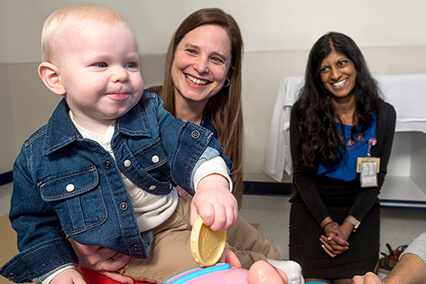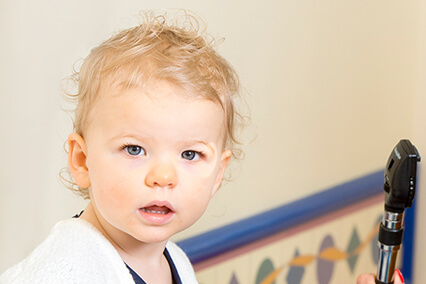Protein C Deficiency: Will’s Story
Meet Will

When Amber and Blake McKinnon’s first child, Ben, was born in 2017, they went through an experience no parent would ever want to repeat. Ben suffered a life-threatening stroke while in the womb, and after he was born, he was treated in the Children’s Mercy Kansas City Level IV Neonatal Intensive Care Unit (NICU).
Ben’s condition was stabilized using blood thinners, and after nine days in the NICU, Amber and Blake took him home. At first, no one knew what caused Ben’s stroke, but eventually he was diagnosed with a rare clotting disorder called protein C deficiency.
The disorder was inherited and increases the risk for developing abnormal blood clots when protein C, which prevents blood clotting, is missing.
Risks for a protein C deficiency
After consulting with a genetic counselor at Children’s Mercy, Amber and Blake learned that protein C deficiency is so rare that it affects only one in 500,000 people. But because they are both carriers of the variant, they had a 25% chance of having another child with the same condition.
When Amber became pregnant with their second child, she was on alert, and so was her high-risk obstetrician.
“Early in the pregnancy, my obstetrician wanted to have an amniocentesis to see if the baby had protein C deficiency,” Amber said. “But at that point, an amniocentesis was a risk to the pregnancy, so I decided to wait.”
As her pregnancy progressed, all continued to go well. “This pregnancy just felt different. I really thought that everything would be fine,” Amber said.
Because Amber had waited until her third trimester to have the amniocentesis and it took several weeks to get the results, she was 36 weeks pregnant before she knew her second baby also had severe congenital protein C deficiency disorder.
“When I found out this baby had the same clotting disorder as Ben, it was a blow,” Amber admitted. “But Ben’s stroke came out of nowhere. This time, we knew there was a chance for a stroke. I felt like we were being more proactive.”
Immediately, Amber’s obstetrician referred her to the Children’s Mercy Elizabeth J. Ferrell Fetal Health Center where a multidisciplinary team met with Amber and Blake to review the situation and develop a delivery plan.
Her team included Ben’s hematologist, along with specialists in maternal-fetal medicine, a neonatologist and a social worker.
Dr. Sharma reached out to a colleague at a hospital in another state who specializes in this disorder. To prevent a stroke, this physician recommended the baby receive a new medication the first day of life called Ceprotin.
Ceprotin is a synthetic version of the missing protein C, and it’s used to treat neonates born with this deficiency and to manage clotting risks for these patients in other critical health care situations, such as surgery.
“One in 2,500 babies has a stroke at birth, but we knew that the risks of stroke and life-threatening clots were much higher for this baby because of the genetic variance. The highest risk was at the time of delivery,” Dr. Sharma explained. “So, we made a plan for Amber to deliver at the Fetal Health Center, and to immediately treat the baby with Ceprotin to prevent clotting.”
Amber and Blake agreed with the plan, and they made another important decision about their baby’s future.

“We think that Ben’s stroke actually happened just before he was born,” Amber said. “This baby was almost full term and thanks to ultrasound scans, we knew he was healthy. I decided I would rather go ahead and deliver the baby so we could start treatment with the Ceprotin, than continue the pregnancy and risk that this baby might have a stroke.”
Amber called the Fetal Health Center team and told them what she was thinking, and since her delivery date was only two weeks away, they agreed.
The next day was May 1, 2019. Amber checked into the Fetal Health Center for a scheduled C-section, and a short time later, the baby arrived.
In the Children’s Mercy NICU, the baby received his first dose of Ceprotin, making him the first child at the hospital to be treated with this new FDA-approved medication.
LOVE WILL.
While the baby received his first infusion of Ceprotin, Amber remained a few steps away in the Fetal Health Center recovering. The family had considered names for the new baby prior to delivery, narrowing the possibilities down to Jake, Jack and Will.
“Initially, we had decided on Will, but we were still going back and forth, trying to decide for sure,” Amber said.
A few days later, Amber had been released from the Fetal Health Center, but was at the hospital to see her baby.
“It had been a particularly rough day,” Amber admitted. “A good friend had come to the hospital to be with me, and she urged me to come outside to get some fresh air.”

As Amber walked outside, her friend told her to look up. “She said, ‘I’ve got to show you something.’” When Amber turned her eyes to the sky, she saw a sign on a construction crane perched high above the groundwork for the Children’s Mercy Research Institute.
“The sign read ‘Love Will.’ It was just a simple statement,” Amber said. “At that moment, I realized that God loves him and has control. I didn’t need to worry. It was a much-needed message at that point in the day.”
And seeing that sign confirmed the couple’s name choice. “Will was the perfect name for our baby.”
Preventing a stroke
Over the next few days, Will continued to receive Ceprotin, the synthetic protein C replacement to prevent clotting and a potential stroke.
“Our coagulation service followed Will closely,” Dr. Sharma said. “He responded well to the new medication and slowly, his protein C levels stabilized.”
Once he was stable, he was transitioned to an anticoagulant that he could take long term. In all, Will spent 18 days in the Children’s Mercy NICU to be certain that the anticoagulant was at the “just right” dose, but the stay was well worth it.
“Will never had a stroke, and thanks to his early diagnosis, he hasn’t had any neurological complications or blood clots, even though he has the same clotting disorder as Ben,” Amber said.
Amber credits Dr. Sharma, the NICU team and the Fetal Health Center, along with her high-risk obstetrician, with making sure Will got the best start possible in life.
“Will is the first child I have taken care of who had a prenatal diagnosis of severe congenital protein C deficiency,” Dr. Sharma said. “Because this condition is so rare, there isn’t a lot of guidance for how to manage delivery. We put a lot of research into the best care for Will, and it paid off.
“Not only is Will doing well, but we can now offer this therapy as clot prevention for the handful of patients we see with protein C deficiency at Children’s Mercy. He is a good example that in certain conditions, stroke can be prevented thanks to genetic studies, early diagnosis and close collaboration with the family,” she added.
“Dr. Sharma was reassuring and did all she could to find the right treatment for Will,” Amber said. “And we had just had been at Children’s Mercy in 2017 with Ben. We got to see some of the same doctors that Ben had. That was very comforting. We trusted them because Ben received such great care here.
“I loved the Fetal Health Center team too,” she added. “I cannot say enough good things about them. It was very convenient that my room was so close to the NICU.
“And in the NICU, if we had a concern, there was always an ‘all-hands-on-deck’ approach. Their team was incredible, and took every concern seriously,” she said.
Growing up, healthy and strong

Since Will’s birth almost two years ago, the family has relocated to Clarinda, Iowa, a small town in the southwest part of the state, about two and one-half hours from Kansas City.
“We’ll continue to come back to Children’s Mercy so that Dr. Sharma can monitor the anticoagulants Ben and Will are on, but the boys are doing great,” Amber said.
Dr. Sharma has prescribed traditional blood thinners to treat them for now, but those are delivered via daily injection. With advances in the field though, she hopes she’ll be able to offer them a drug just approved by the FDA for use in children that doesn’t require monitoring, and that can be taken by mouth.
“This will make it much easier to manage the boys’ clotting disorder,” Dr. Sharma said.
Until then, the boys will remain on traditional blood thinners. Ben’s never had another stroke, and he’s continued to grow and develop on pace with any healthy 4-year-old. Amber describes him as her sensitive child. “Ben takes everything to heart,” she said.
But Will is another story. “Will pushes the limits and wants to do everything big brother does. They have a fun relationship,” she added.
“Will is definitely my ‘wild child.’ When I look at him, I feel like he fits his name,” Amber said. “No other name would do for this boy.”
Pediatric stroke: Ben's story
The Children’s Mercy Comprehensive Stroke Clinic stabilized newborn Ben McKinnon using blood thinners after he had a life-threatening perinatal stroke. Today, the toddler is walking and running, thanks to early intervention.

Perinatal stroke: Sadie's story
Before she was born, Sadie Ewy suffered a perinatal stroke. That’s why her family turned to the Children’s Mercy Comprehensive Stroke Clinic. Now 2, she’s doing so well she’s “high-fiving” her doctors.

